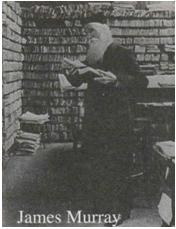-
(单词翻译:双击或拖选)
THE OXFORD1 ENGLISH DICTIONARY
You may think that English dictionaries have been used2 for many, many centuries. The spelling of English has always been a problem but it was more of a problem in the days before a dictionary. Then people could spell words in different ways which you might find interesting. But it made reading3 English much more difficult. So dictionaries were invented to encourage everybody to spell the same. In fact, an English dictionary like the kind you use today wasn't made until the time of the late Qing Dynasty. Three men did most of the important early work on dictionaries: Samuel Johnson, Noah Webster, and James Murray. These men spent nearly all of their lives trying to collect words for their dictionaries. For them, it wasn't only a job; it was a wonderful journey4 of discovery5. The largest dictionary in the world is the Oxford English Dictionary, or OED for short. The idea for this dictionary came from an important meeting in Britain in 1857. Twenty-two years later, Oxford University asked James Murray to be the editor6 of its new dictionary.
Murray had never been to college. At the age of fourteen, he left his village school in Scotland7 and taught himself while working in a bank. Later he became a great teacher. After Oxford gave him the job, Murray had a place built in the garden behind his house to do his work. Part of it was one metre underground. In winter it felt like a barn8, he had to wear a heavy coat and put his feet in a box to keep warm. Every morning, Murray got out of bed at five o'clock and worked several hours before breakfast. Often he would work by candle light into the evening. Murray hoped to finish the new dictionary in ten years. But after five years, he was still adding words for the letter A! Then others went to work with Murray, including his two daughters. He worked on the dictionary until he was very old. Forty-four years later, in 1928, other editors9 finished it. It included more than 15,000 words in twelve books. And you thought your English dictionary was big!

 收听单词发音
收听单词发音
1
Oxford

|
|
| n.牛津(英国城市) | |
参考例句: |
|
|
|
2
used

|
|
| adj.用旧了的,旧的;习惯于…;过去惯/经常 | |
参考例句: |
|
|
|
3
reading

|
|
| n.阅读,知识,读物,表演,对法律条文的解释;adj.阅读的 | |
参考例句: |
|
|
|
4
journey

|
|
| n.旅行,旅程;路程 | |
参考例句: |
|
|
|
5
discovery

|
|
| n.发现,发觉;被发现的事物;发明 | |
参考例句: |
|
|
|
6
editor

|
|
| n.编者,编辑,主笔;v.编辑器 | |
参考例句: |
|
|
|
7
Scotland

|
|
| n.苏格兰 | |
参考例句: |
|
|
|
8
barn

|
|
| n.谷仓,饲料仓,牲口棚 | |
参考例句: |
|
|
|
9
editors

|
|
| n.编辑( editor的名词复数 );(广播电视节目的)记者;(影片、广播电视节目的)剪辑员;编辑程序 | |
参考例句: |
|
|
|

















